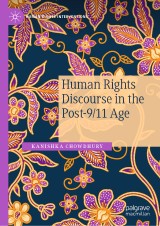Details

Human Rights Discourse in the Post-9/11 Age
Human Rights Interventions
|
90,94 € |
|
| Verlag: | Palgrave Macmillan |
| Format: | |
| Veröffentl.: | 21.03.2019 |
| ISBN/EAN: | 9783030138721 |
| Sprache: | englisch |
Dieses eBook enthält ein Wasserzeichen.
Beschreibungen
This book offers a materialist critique of mainstream human rights discourse in the period following 9/11, examining literary works, critical histories, international declarations, government statutes, NGO manifestos, and a documentary film. The author points out some of the contradictions that emerge in contemporary rights language when material relations are not sufficiently perceived or acknowledged, and he directs attention to the role of some rights talk in maintaining and managing the accelerated global project of capital accumulation. Even as rights discourse points to injustices—for example, injustices related to labor, gender, the citizen’s relationship to the state, or the movement of refugees—it can simultaneously maintain systems of oppression. By constructing subjects who are aligned to the interests of capital, by emphasizing individual “empowerment,” and/or by containing social disenchantment, it reinforces the process of wealth accumulation, supports neoliberal ideologies, and diminishes the possibility of real transformation through collective struggle.
1. Introduction: Reading Rights Discourse in a Transnational Economy.- 2. Historicizing Rights Discourse Post-9/11.- 3. Workers' Rights, Exploitation, and the Transactional Moment.- 4. Gender Rights and the Politics of Empowerment.- 5. "Tomorrow There Will Be More of Us": Rights Discourse, the State, and Toxic Capitalism in Indra Sinha's <i>Animal's People</i>.- 6. Refugees' Rights: Capital, Óscar Martínez’s <i>The Beast,</i> Gianfranco Rosi’s <i>Fuocoammare</i>, and the “Problem” of the Surplus Population.- 7. Conclusion.
<div><b>Kanishka Chowdhury </b>is Professor of English and Director of the Program in American Culture and Difference at the University of St. Thomas, MN, USA. His first book, <i>The New India: Citizenship, Subjectivity, and Economic Liberalization</i>, was published by Palgrave Macmillan in 2011.<br></div><div><br></div>
This book offers a materialist critique of mainstream human rights discourse in the period following 9/11, examining literary works, critical histories, international declarations, government statutes, NGO manifestos, and a documentary film. The author points out some of the contradictions that emerge in contemporary rights language when material relations are not sufficiently perceived or acknowledged, and he directs attention to the role of some rights talk in maintaining and managing the accelerated global project of capital accumulation. Even as rights discourse points to injustices—for example, injustices related to labor, gender, the citizen’s relationship to the state, or the movement of refugees—it can simultaneously maintain systems of oppression. By constructing subjects who are aligned to the interests of capital, by emphasizing individual “empowerment,” and/or by containing social disenchantment, it reinforces the process of wealth accumulation, supports neoliberal ideologies, and diminishes the possibility of real transformation through collective struggle.<div><br></div><div><p><b>Kanishka Chowdhury</b> is Professor of English and Director of the Program in American Culture and Difference at the University of St. Thomas, MN, USA. His first book, <i>The New India: Citizenship, Subjectivity, and Economic Liberalization</i>, was published by Palgrave Macmillan in 2011.</p><br></div>
Proposes an alternative logic for comprehending rights language Offers a radical re-envisioning of future possibilities of human rights discourse Focuses specifically on the language of human rights and puts into crisis such liberatory categories as freedom, fairness, empowerment, justice, etc
“This luminous book engages critically with the contemporary discourse of human rights and offers a robust rejoinder and critique to its liberal pieties. In a forthright and unfashionable defense of Marxism, Chowdhury shows convincingly why Marxist analysis is far superior to human rights discourse in challenging oppression and supporting freedom, dignity and equality in the present moment.” (Henry Schwarz, Professor, English, Georgetown University, USA)<p>“Ours is a historical moment characterized by crisis, the expressions of which include intensified violence in nearly all realms of social, political and economic life. In such dark times, it is tempting to turn to the language of human rights in an effort to locate a universal principle from which to ground a humane response. Chowdhury, in this masterful dialectical accountof human rights discourse, shows us the salutary aspects of the movements to defend human rights while very precisely locating the limits of such movements by situating human rights within a larger critique of capital, particularly the contemporary phase of neoliberal capital. Intervening in the scholarship on human rights as well as postcolonial literary studies, Chowdhury offers a timely and necessary corrective from a Left perspective.” (Bret Benjamin, Associate Professor, English, SUNY Albany, USA)<br></p>
<p> </p>
<p> </p>
<p> </p>
<p> </p>
Diese Produkte könnten Sie auch interessieren:

Inclusión educativa de niños, niñas y adolescentes migrantes venezolanos, en Colombia

von: Douglas Jiménez

15,99 €
















